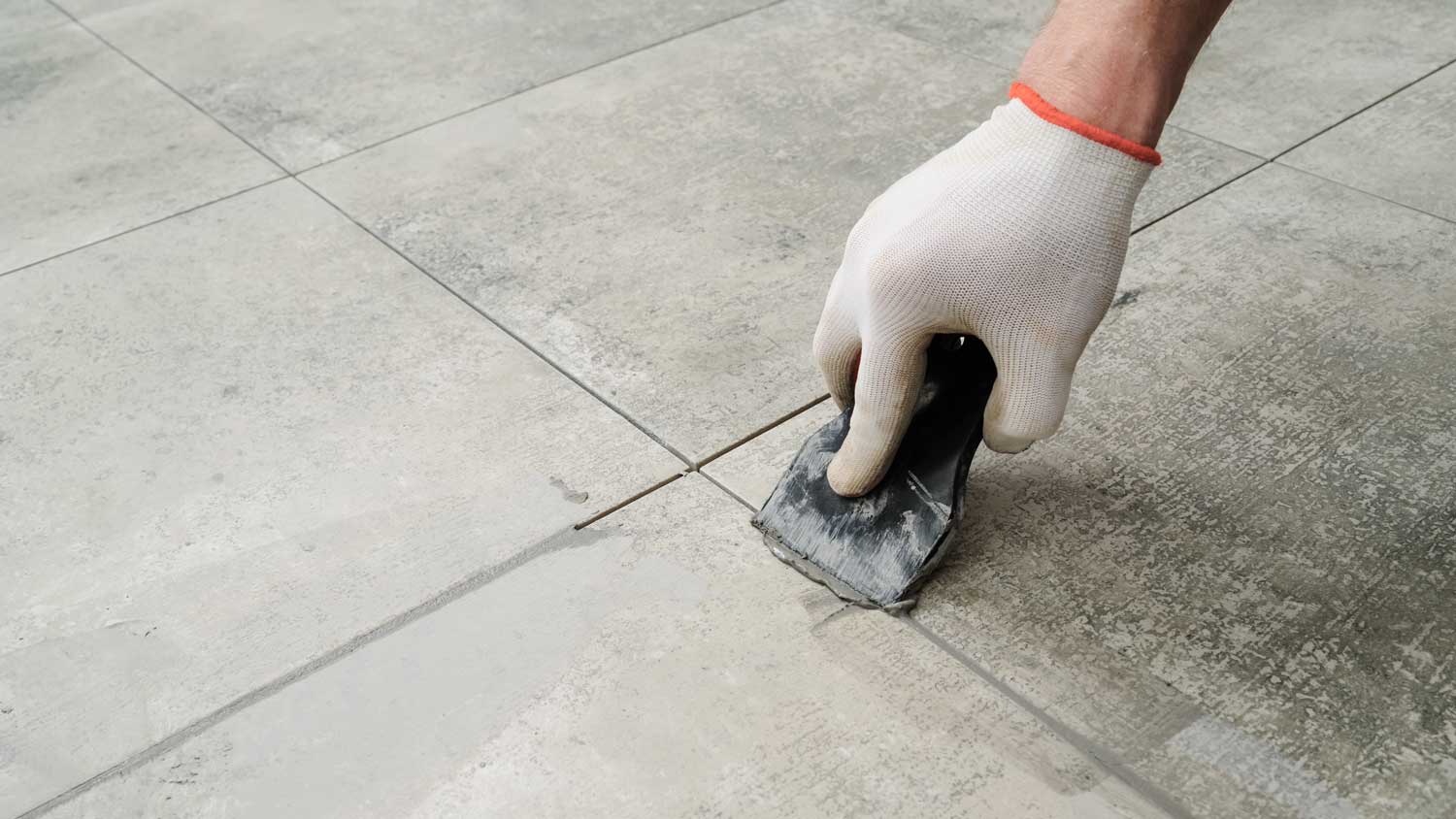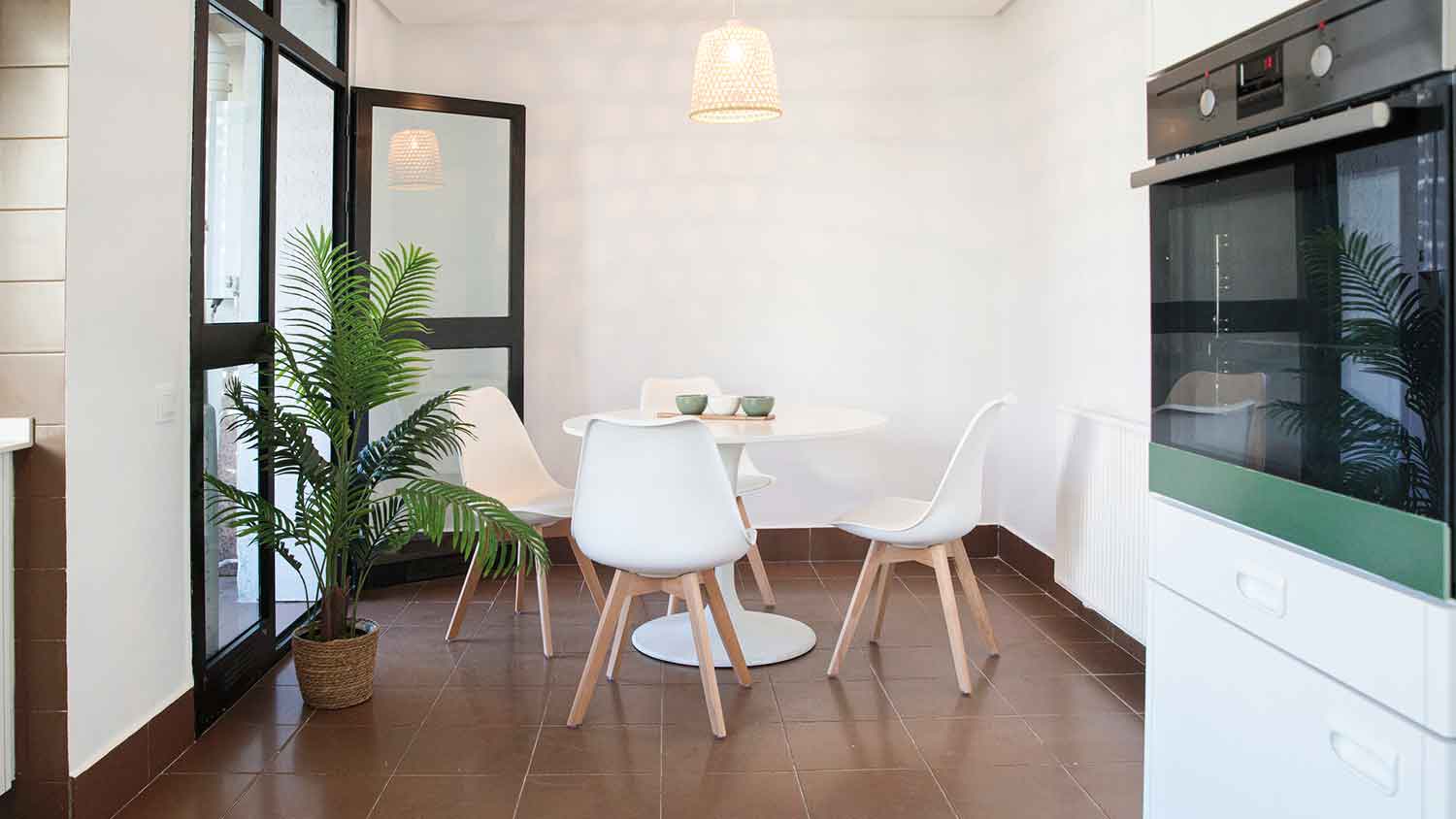
Whether it’s on your floor, walls, or shower, ceramic tile can add style to your space. So, how much does ceramic tile installation cost? Let’s break it down.
Most grout repairs cost between $150 and $600, depending on the extent of damage, area size, and material type.


Grout repair restores the appearance of the tile and prevents water damage.
Total repair costs depend on repair type, area size, and grout material.
Minor crack repairs start at $50, while complete grout replacement costs up to $1,200.
Professional repairs cost $30 to $75 per house, ensuring durability and a seamless finish.
Regular maintenance can extend grout life and reduce future costs.
Grout repair costs range from $50 to $1,200, costing an average of $350 per project. Homeowners can expect to pay $8 to $30 per square foot, depending on the repair type, area size, and materials.
Grout repair is essential for maintaining your tile’s appearance and preventing costly water damage. This guide will help you understand what drives grout repair cost and how to plan for your project, whether you’re tackling a small patch or a full room.
Several key factors influence the cost of grout repair. Let’s break down what shapes your total price and how each element affects your budget.
The type of grout repair you need plays a significant role in your final bill. Repairs can range from simple crack fills to full grout replacement, each with different costs and benefits. Knowing when a repair is essential versus cosmetic helps you prioritize your project and manage expenses.
| Repair Type | Average Cost Range |
|---|---|
| Minor crack or spot | $50–$150 |
| Spot repair | $75–$250 |
| Regrouting | $200–$600 |
| Full replacement | $400–$1,200 |
Minor grout repairs address hairline cracks or small gaps that let in moisture. These fixes are essential, especially in wet or high-traffic areas, to prevent more extensive water damage. High-use spaces like showers or entryways may require minor repairs every few years. Most minor spot repairs cost between $50 and $150 and can be completed in a few hours.
Regrouting involves removing old or damaged grout and applying new grout between tiles. This process is necessary when grout is stained, cracked, or flaking, and it helps restore both appearance and water resistance.
Kitchen, bathroom, and shower regrouting services are often needed every eight to 15 years. Partial regrouting costs less than a full-area job, but expect to pay $200 to $600 for most regrouting projects.
Full grout replacement is required when grout is extensively damaged, moldy, or crumbling throughout the tile area. This process protects the underlying tile and subfloor, improving home value and longevity.
Older homes and wet rooms may need complete replacement more frequently, especially if maintenance has been neglected. Full grout replacement costs $400 to $1,200 and is more involved than spot repairs or regrouting.
Sometimes, deep cleaning and grout removal are enough to restore the appearance of the tile without full repair. Cleaning is a preventative measure that helps delay the need for costly fixes and should be done annually in kitchens and bathrooms.
Grout cleaning costs $0.75 to $3 per square foot, which is less than most repair jobs. If you notice persistent stains or mold, cleaning may not be enough, and repair could be necessary.
The type of tile or area where grout repair is needed will impact your total cost. Floors, walls, showers, and backsplashes all present unique challenges and price points. The complexity of the tile layout and the material type—ceramic, porcelain, stone, or mosaic—also influence what you’ll pay.
| Area/Tile Type | Average Cost Range |
|---|---|
| Floor (ceramic/porcelain) | $150–$600 |
| Shower | $250–$900 |
| Backsplash | $100–$350 |
| Natural stone/mosaic | $250–$800 |
Repairs for natural stone or mosaic tiles cost more due to delicate handling and specialty grout requirements. Showers and wet areas are pricier because of waterproofing and mold concerns.
Grout brand selection can affect your repair cost, though not as much as other factors. Premium brands offer better color options, stain resistance, and warranties, often at a higher price per pound or tube.
While some brands are more expensive to repair or replace, the added durability and color matching may be worth it, especially for high-traffic or visible areas. Always check if your chosen brand offers a warranty, as this can provide peace of mind for future repairs.
The size of the repair area is a major driver of the cost of grout repair. Small patches or single-room repairs are priced higher per square foot, while large projects benefit from economies of scale. A whole bathroom or a large floor may cost less per square foot but more overall.
| Area Size (Sq. Ft.) | Average Cost Range |
|---|---|
| 1–10 | $50–$250 |
| 11–50 | $200–$600 |
| 51–150 | $400–$1,200 |
Smaller repairs often come with minimum service fees, while larger projects may offer better price-per-foot rates.
Grout repair materials range from basic sanded and unsanded options to epoxy and specialty blends. The material you choose impacts both durability and cost.
Epoxy and specialty grouts cost more but offer superior mold resistance and longevity. Custom colors and stain-resistant blends can add to your overall project cost, sometimes making up 20% to 30% of the total.
| Grout Material Type | Description | Average Cost Range per Sq. Ft. |
|---|---|---|
| Sanded | Standard for wider joints | $8–$18 |
| Unsanded | For narrow joints, wall tiles | $10–$20 |
| Epoxy | Stain-resistant, high durability | $15–$30 |
| Acrylic/specialty | For special color or performance | $18–$35 |
Some grout brands and contractors provide warranties that may affect your grout repair cost. Warranties cover defects in materials or workmanship for a set period, often one to five years.
While warranties can add to upfront costs, they help offset future repairs if issues arise. For large or high-traffic repairs, consider extended warranties for extra protection. Always ask what is covered before committing to a contractor or brand.
Ongoing maintenance plans are available from some grout professionals and cleaning companies. These plans include regular cleaning, sealing, and inspections for a set monthly or annual fee.
Maintenance plans can cost $150 to $300 per year and help prevent premature grout failure, saving you money in the long run. Regular maintenance extends grout life and reduces the risk of major repairs.
Tile contractors, handypersons, or specialized grout repair pros perform grout repair. Labor rates vary by region, experience, and project complexity. Expect to pay $30 to $75 per hour for grout repair services, or a flat per-project fee.
Minimum service charges or trip fees often apply to small jobs, increasing your total grout repair cost. Complex layouts or hard-to-reach areas may also require more labor time.
Where your project is located will influence the cost of grout repair. Urban areas and regions with higher living costs see higher labor rates. Kitchens, bathrooms, showers, and outdoor spaces all have unique needs that impact pricing. Second-story bathrooms or tight spaces increase labor time and cost. Always factor in accessibility when budgeting for your project.
During grout repair, you may discover other issues that need attention. Common add-ons include tile replacement fees, caulking, sealing, mold remediation, and waterproofing. Related repairs, like fixing a damaged subfloor or addressing water damage, will increase your total bill.
Optional upgrades such as color sealing, anti-microbial grout, or decorative grout lines can enhance appearance and durability but come at a higher price. Plan for some flexibility in your budget in case additional repairs are needed.
Deciding whether to repair grout or replace it entirely depends on several factors. If your grout is relatively new and damage is limited, repair is often the most cost-effective choice. When grout is old, crumbling, or moldy throughout, full replacement may be necessary to protect your tile and subfloor.
The 50% rule is a good guideline when deciding between repair and replacement. If the grout repair cost exceeds half the price of full replacement, it’s better to replace all the grout or even the tiles.
Repairs are less expensive upfront but may need to be repeated, while replacement offers a longer-term solution and can boost home value. Always consider the age of your grout, the extent of damage, and any underlying issues before deciding.
The low cost of hiring a local grout repair pro for this project makes getting professional results worth it. Pros know the best techniques and products to use to keep your tiles looking their best for longers.
Paying for expertise is worth it for this project because:
Grout pros have specialized tools like high-pressure steam machines and sealers that create lasting results.
Grout repair pros will select the right materials based on whether your tiles are natural tone, porcelain, ceramic, or other options.
Grout pros can spot underlying issues like water intrusion or structural unevenness that might be causing your grout problem.
Pros have professional sealants that can keep your floors safe from moisture intrusion, gritty dirt, staining, and more for years to come.
There are several ways to keep your grout repair cost manageable:
Get multiple quotes from local grout repair professionals.
Schedule repairs during off-peak seasons to take advantage of potential discounts.
Choose standard grout colors and materials to avoid custom charges.
Maintain grout regularly to prevent costly repairs.
Bundle grout repair with other tile or bathroom projects for savings.
Consider partial repairs or spot fixes when full replacement isn’t necessary.
Perform basic cleaning and prep work yourself to reduce labor costs.
Track when your grouting services to help a pro determine natural wear and tear versus an underlying issue that's compromising grout.
If grout constantly looks dingy or discolored, discuss updating to a darker color to conceal staining.
Consider replacing or repairing any cracked or chipped tiles before regrouting them.
If your budget allows, assess all existing thresholds to see if they need updating.
Home is the most important place on earth, which is why Angi has helped more than 150 million homeowners transform their houses into homes they adore. To help homeowners with their next project, Angi provides readers with the most accurate cost data and upholds strict editorial standards. We extensively research project costs to develop the pricing data you see, so you can make the best decisions for you and your home. We rely on reputable sources, including the U.S. Bureau of Labor Statistics, academic journals, market studies, and interviews with industry experts—all to ensure our prices reflect real-world projects.
Want to help us improve our cost data? Send us a recent project quote to [email protected]. Quotes and personal information will not be shared publicly.
From average costs to expert advice, get all the answers you need to get your job done.

Whether it’s on your floor, walls, or shower, ceramic tile can add style to your space. So, how much does ceramic tile installation cost? Let’s break it down.

Tile varies dramatically in price, but there’s something for every budget. This guide will help you plan for tile installation costs, no matter the project.

The cost to install travertine tile depends on materials and the size of the project. This guide to travertine tile cost will help you budget accordingly.

Planning a tile project? Use this calculator to determine how much tile you need based on your project’s square footage and tile dimensions.

Porcelain and ceramic tiles aren’t exactly the same. Discover the key differences between porcelain versus ceramic tile, including cost, durability, and more.

Regrouting your shower takes some time because it involves multiple days’ worth of work. Use this guide to help you decide who to hire to regrout your shower.